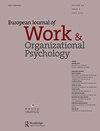不能胜任这项任务:对工作与家庭冲突的男女的看法
IF 3.4
2区 心理学
Q2 MANAGEMENT
European Journal of Work and Organizational Psychology
Pub Date : 2022-12-06
DOI:10.1080/1359432X.2022.2151900
引用次数: 1
摘要
关于工作与家庭冲突的讨论是司空见惯的。然而,大多数谈话都是基于个人如何最好地管理工作和家庭需求。很少有人知道其他人是如何看待和反应这些经历的人的。基于社会评价理论和刻板印象维持理论,我们假设由于性别刻板印象规定的理想女性高度投入家庭,理想男性高度投入工作,经历工作干扰家庭的女性(WIF)和经历家庭干扰工作的男性(FIW)会引起负面反应。3项实验研究结果(N Study1 = 569;N Study2 = 299;N Study3 = 275)和一项实地研究(N = 219)仅为这一假设提供了有限的证据。然而,在所有四项研究中,他们一致表明,在与工作相关的几个方面(代理、支配、尊重、晋升、工作表现、奖励分配),观察人员和他们的主管对经历过FIW的男性和女性的系统性评价和待遇都不如经历过FIW的员工。然而,他们被认为是更好的父母。我们讨论了我们的发现对工作-家庭冲突研究的意义。本文章由计算机程序翻译,如有差异,请以英文原文为准。
Not up to the task: perceptions of women and men with work-family conflicts
ABSTRACT Conversations about work-family conflict are commonplace. However, most of the conversation is based on how individuals can best manage work and family demands. Little is known about how others perceive and react towards individuals who go through this experience. Building on theories of social evaluation and stereotype maintenance, we hypothesized that due to gender stereotypes, which prescribe the ideal woman as highly invested in family and the ideal man as highly invested in work, women who experience work interference with family (WIF) and men who experience family interference with work (FIW) would elicit negative reactions. Results of three experimental studies (N Study1 = 569; N Study2 = 299; N Study3 = 275) and a field study (N = 219) provided only limited evidence for this assumption. However, they consistently showed across all four studies that both men and women who experience FIW were systematically judged and treated less favourably compared to employees with WIF, by observers and their supervisors, on several work-related dimensions (agency, dominance, respect, promotability, work performance, reward allocations). However, they were judged to be the better parents. We discuss the implications of our findings for work-family conflict research.
求助全文
通过发布文献求助,成功后即可免费获取论文全文。
去求助
来源期刊
CiteScore
8.00
自引率
2.30%
发文量
40
期刊介绍:
The mission of the European Journal of Work and Organizational Psychology is to promote and support the development of Work and Organizational Psychology by publishing high-quality scientific articles that improve our understanding of phenomena occurring in work and organizational settings. The journal publishes empirical, theoretical, methodological, and review articles that are relevant to real-world situations. The journal has a world-wide authorship, readership and editorial board. Submissions from all around the world are invited.

 求助内容:
求助内容: 应助结果提醒方式:
应助结果提醒方式:


